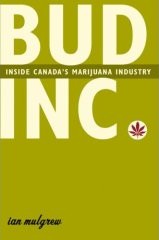DRCNet
Book
Review:
"Bud,
Inc.:
Inside
Canada's
Marijuana
Industry,"
by
Ian
Mulgrew
(2005,
Random
House
Canada,
287
pp.,
approx.
$US
29.00,
HB)
12/16/05
Phillip S. Smith, Writer/Editor, [email protected], 12/16/05 Vancouver Sun justice columnist Ian Mulgrew has been covering the marijuana beat in British Columbia for a decade, and his interest in the psychoactive herb goes back much further than that – in fact, Mulgrew easily admits having sold a baggie or two as a teen himself. If there is anyone who could write the book on Canada's cannabis economy, it is Mulgrew, and with "Bud, Inc." he provides a fascinating look at Canada's largest cash crop and where it could be headed.
From there, Mulgrew sketches the contours of Canada's pot economy, visiting Reeferman, the new king of the hill among Canadian seed producers. Reeferman has emerged from a checkered past (once a neo-Nazi skinhead, then an informant for the RCMP against the neo-Nazi skinheads) to win world renown for his massive seed-breeding operation. Mulgrew portrays him on his remote farm, tending to his genetics, counting up his fortune in seed sales – mostly to the US – and dreaming of legalization. For Reeferman, that means corporatization of the weed and seed business, and he thinks he can outperform the competition. Perhaps it shouldn't be surprising in a book called "Bud, Inc.," but many of the people Mulgrew profiles are basically businessmen eying a huge potential profit from the pot business, whether it's in seeds, lights, specialized nutrients, medicines, or even baked goods. Sure, most of them live life with a joint in hand -- marijuana use is so pervasive among Mulgrew's subjects that you can almost smell the smoke coming off the pages – but this is about business. While some of the business is the romantic criminality of pot smuggling to the US, and Mulgrew tells us about that, too, many of Canada's cannabis entrepreneurs have their eyes fixed on profits from a legal market. But it's not all about the money. In his discussion of medical marijuana, Mulgrew talks to such walking saints as Philippe Lucas of the Vancouver Island Compassion Society and Hilary Black of Vancouver's Compassion Club, whose stalwart endeavors have brought solace to countless more sick and suffering Canadians than Health Canada's flaccid medical marijuana program. And even when it's about the money, it's not all about the money. Mulgrew tells the story of the rise and fall of Da Kine Café, which for a glorious few months last year sold marijuana openly and without medical pretense on Vancouver's Commercial Drive. While the owners and operators were indeed raking in the cash, they were just as concerned with pushing the envelope for legal cannabis. Unwisely, Mulgrew reports, they pushed too far too fast, and Vancouver's pro-legalization Mayor Larry Campbell was forced to shut them down. Pot-selling establishments remain in Vancouver, of course, but now they're more low-key. One of the most striking aspects of "Bud, Inc." is the casualness with which the players mention that they are smuggling huge quantities of pot or growing huge fields or otherwise violating Canada's drug laws. That's because Canada does not enforce marijuana prohibition with anything near the medieval rigor of the United States. Although Mulgrew doesn't mention it, this relative leniency has played a key role in the emergence of Canadian marijuana activism. Unlike the US, where many of Mulgrew's principals would be looking at literally decades in prison, Canada's relatively low-key approach gives those true believer entrepreneurs like Emery and Reeferman and all the rest the political space in which to mix drugs and activism. And we in the United States should be very, very grateful for that. That activism, combined with a Canadian political sensibility much more reasoned and thoughtful than that of the US, has already largely succeeded in breaking down social opposition to fundamental marijuana law reform. And with marijuana growers all across Canada creating economic facts on the ground, there is probably no going back now – only forward. Decriminalization, as proposed by the ruling Liberal government, is a non-starter, Mulgrew writes, because it leaves a criminalized market, and we all know who benefits from that: "Marijuana is the anchor tenant in organized crime's shopping mall of vice," he argues, citing the involvement of the Hell's Angels and various ethnic crime groups in the marijuana trade. "With legalization, the criminals won't disappear, but their wealth, their scope, and their reach will be greatly diminished. I believe legalization is needed, even though it will bring its own set of problems." Canada hasn't embraced legalization yet. With "Bud, Inc.," however, Mulgrew makes a strong case that it is inevitable.
|

